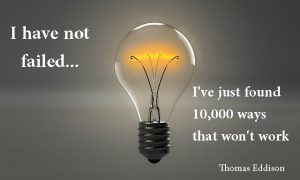Why don’t we love our failures instead of letting them make us feel small? Following on from my last post of looking back to look forward I am shining the spotlight on failure. In this period of reflection have a look at your failures. Gather them together whilst being careful not to re-engage with any associated resentments or disappointments.
Take the time to look at them collectively and dispassionately. Are there any common threads or themes to them? Could the circumstances that led to them have been avoided in hindsight? Were you improperly advised? Did you just make a complete hash of it for no particular reason?
Love your failures don’t beat yourself up over them
This is not a “woe is me” session. This is a dispassionate analysis of what worked and what didn’t. All too often we find failure to be a taboo subject and we lock our past mistakes away. Instead you need to shine a cold rational light on things that went wrong otherwise how will you avoid them in the future? If Edison had ignored his failures, we would not have the light bulb. Have a look at some powerful quotes on failures here for inspiration.
By reviewing all your past niggles, problems and roadblocks it gives you a chance to learn from your failures. Write down or commit to memory the things never to do in the future. Learn to recognise the warning signs so you can jump on them should they occur again. Replace or get rid of anyone who has been instrumental in your failure. Change your behaviour if that would have resulted in a different outcome.
Now you love your failures act upon them
One of the hardest things to do as a business person is to admit you followed bad advice. Even harder if you spent significant sums of money on that advice. There is a fine balance here. This is not a blame game. If you know in your heart that you didn’t really take the advice properly then the failure here is one of implementation, your implementation not theirs. However, if your advisor was completely wrong for you then rethink where you get future advice. Build in check points with any future consultants or advisors. Ensure that you are not tied to a long term financial arrangement without a “get out of jail free card” you can play if it is not working.
Analyse what did not work but be specific. Sometimes a course of action that failed is not totally without merit. What did work? What did you learn? Be honest with yourself. Did you follow that path because others said it was a good idea or, “everyone is doing this”? An example I can give is that I don’t use Facebook to promote myself as a professional speaker. This is despite the clamour that Facebook is “the” social network to use. I have been advised in the past to use this medium and it just did not work for me. I trusted my gut on this and I was right. Do not feel you must do something if every instinct goes against it.
Loving your failures is a sign of strength
 By loving our failures and recognising them just as life business lessons it makes us stronger, more resilient and wiser as we move on. It helps inform future decisions with objectivity. If you are honest with yourself and can see your own weaknesses, you can turn that into strength. It helps you to choose a path that leads to ultimate success. This is not to say that you become risk averse. Your greatest achievements probably occurred because of a risk you took, a calculated risk. Risk does not automatically mean failure; often playing it small leads to a disappointing result.
By loving our failures and recognising them just as life business lessons it makes us stronger, more resilient and wiser as we move on. It helps inform future decisions with objectivity. If you are honest with yourself and can see your own weaknesses, you can turn that into strength. It helps you to choose a path that leads to ultimate success. This is not to say that you become risk averse. Your greatest achievements probably occurred because of a risk you took, a calculated risk. Risk does not automatically mean failure; often playing it small leads to a disappointing result.
By using this type of reflection, I can honestly say I have never knowingly made the same mistake twice. I may make future ones however they tend to decrease as the years’ pass.


